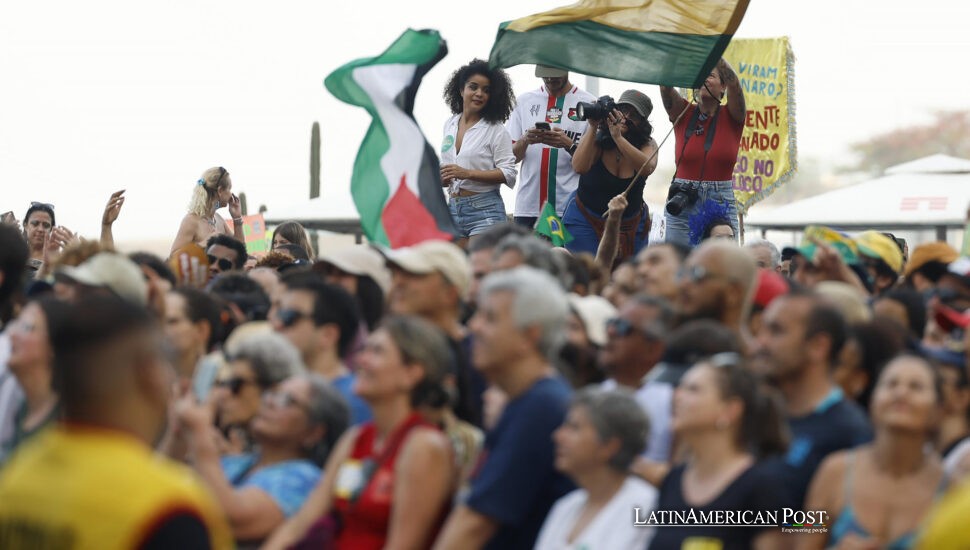Brazilian Democracy Keeps the Beat While Congress Rushes to Pass Amnesty

On Rio’s Copacabana, a protest turned into a warning as Caetano Veloso, Chico Buarque, Gilberto Gil, and Djavan led thousands in opposition to a rushed amnesty push that could shield Jair Bolsonaro. Culture answered politics, insisting accountability is non-negotiable in Brazilian democracy today.
When a Rally Becomes a Repertoire
“Congress, enemy of the people” was the banner; music was the method. What began as a political protest against a fast-tracked amnesty bill morphed into a civic concert, headlined by Caetano Veloso, 83, who arrived atop a trio elétrico in a blaze of yellow. His message was as sharp as the Atlantic air: “No amnesty and with democracy—that is a beautiful Brazil,” he told the crowd with a smile, in remarks carried by EFE.
Veloso’s set list doubled as a syllabus in memory. He revisited “Alegria, alegria” and “Desde que o samba é samba,” then invited Djavan to join for “Sina.” Soon Chico Buarque and Gilberto Gil climbed aboard—Buarque in green, Gil beside Djavan’s blue—forming a living flag of defiance. Copacabana was given more than nostalgia; it was given a reminder that Brazilian music has long been a ledger of resistance.
During pauses, the crowd supplied its own chorus, chanting “sem anistia” until the syllables beat like a metronome of conscience. Along the shore, inflatable caricatures of Jair Bolsonaro in prison stripes bobbed above national flags. “Up with our democracy. Let’s fight for it always,” Djavan shouted, according to EFE. The sky darkened into evening, but the point did not dim: in Brazil, art is no backdrop to politics—it is a frontline.
Amnesty by Urgency, Impunity by Design
The target was a parliamentary maneuver with stakes far larger than the procedure itself. The Chamber of Deputies approved an “urgency regime” for an amnesty bill, sending it straight to the floor and bypassing committee scrutiny. On paper, the measure would absolve those who stormed the Supreme Court, Congress, and the presidency on January 6, 2021. In practice, far-right leaders hope to stretch their cover to coup plotters already convicted, including Bolsonaro, who faces a 27-year sentence.
Urgency is not neutral. It is a decision to outrun debate, muzzle public input, and trivialize the constitutional gravity of January 8. When legislators convert due process into a sprint, the finish line is not reconciliation—it is erasure. That is why the chant was categorical. “No amnesty” here does not reject forgiveness in principle; it rejects the political laundering of an assault on democracy itself.
The soundtrack fit the stakes. When Buarque and Gil sang “Cálice”—a hymn of defiance against dictatorship—the lyrics ricocheted across decades. “Shut up” was the dictatorship’s refrain; its echo in 2025 reminds Brazilians that authoritarianism always returns first with silence.
Symbols, Memory, and a Beach That Remembers
Copacabana is no stranger to contested memory. Just weeks earlier, the same beach hosted a Bolsonaro-aligned rally, with the former president calling in on a son’s mobile phone. The very next day, the Supreme Court ordered his house arrest. The sand, then, serves as a stage for two competing claims: one seeking absolution without accountability, and another demanding the opposite.
Sunday’s Copacabana rally multiplied. Demonstrations echoed through São Paulo, Brasília, Belo Horizonte, and even crossed oceans with smaller gatherings in Lisbon, London, and Berlin. That spread matters. It shows that rejecting a catch-all amnesty is not a regional mood or a celebrity cause—it is a national argument about Brazil’s democratic identity.
Veloso, Gil, Buarque, and Djavan have never hidden their politics. During Bolsonaro’s presidency, they organized protests, particularly against environmental policies. But Sunday’s stage felt different: this was not about forests or funding. It was about the constitutional canopy itself. To treat January 8 as a misadventure fit for legislative absolution is to pretend the torching of buildings and storming of chambers were impatience rather than intentional assaults on democracy. Pretending so is an invitation to repetition.

What Accountability Asks of Congress Now
Amnesty’s defenders argue that clemency heals, that peace requires drawing a line. It is a seductive sentiment—and a dangerous one when misapplied. Brazil’s history with amnesty is fraught. The 1979 law that shielded torturers and tortured alike is still a wound. To repeat that model now would not be irony—it would be malpractice.
Accountability after a democratic rupture is not a matter of vengeance. It is institutional self-respect. It tells would-be insurrectionists that elections—not mobs—decide power. It tells soldiers and police that loyalty is owed to the Constitution, not to any man. And it tells the millions who watched January 8 in horror that their faith in the ballot is still binding.
If Congress truly seeks reconciliation, it should legislate to strengthen truth-telling, protect whistleblowers, fund deradicalization efforts, and guarantee reparations where state failures occurred. It should invest in civic education and fortify the institutions attacked that day. But it must not confuse healing with forgetting, or peace with permissiveness.
Also Read: Colombia’s Reckoning With Dignity: Euthanasia Access Expands Amid Unfinished Debate
On Copacabana, culture did what institutions sometimes struggle to do: it made the argument vivid. The message from the stage—“no amnesty”—was not a musician’s whim. A citizen demanded that the rule of law be more than a chorus line in Brazil’s democracy.





